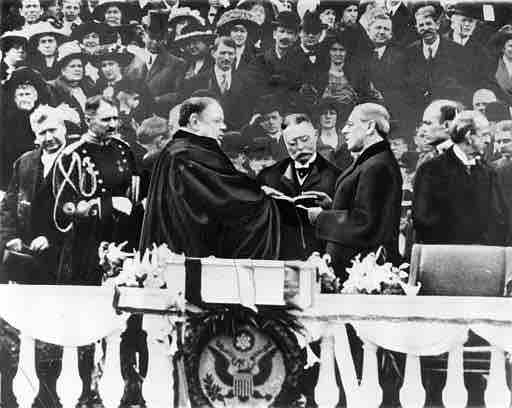Wilson's First Term (1913–1917): Economic Issues
Many of Wilson’s first-term efforts involved persuading a Democratic Congress to pass progressive economic reforms. Some argue that Wilson successfully pushed a legislative agenda that few presidents have equaled, and remained unmatched until the New Deal. This included the Federal Reserve Act, the Underwood Tariff, the Federal Trade Commission, the Clayton Antitrust Act, and the Adamson Act.

Wilson's First Presidential Inauguration
On March 4, 1913, Woodrow Wilson took the oath of office in Washington, D.C., for his first term as President.
In late 1913, Wilson secured passage of the Federal Reserve Act, an Act of Congress that created the Federal Reserve System, the central banking system of the U.S., and granted it the legal authority to issue currency. To create the Federal Reserve System, he had to negotiate a compromise between conservative Republicans (led by Senator Nelson W. Aldrich), and the powerful left wing of the Democratic Party (led by Secretary of State William Jennings Bryan). Wilson's plan passed in December 1913, and the new system began operations in 1915. A complex business-government partnership that to this day dominates the financial world, the Federal Reserve System played a major role in financing the Allied and American war efforts during the two World Wars.
Another landmark of his first term was his effective mobilization of public opinion behind tariff changes, beginning in 1913 with passage of the Revenue Act, better known as the Underwood Tariff, in which revenue lost by lower tariffs was replaced by a new federal income tax. Wilson also pursued a new approach to encouraging competition through the Federal Trade Commission. He led the creation of the Clayton Antitrust Act of 1914, outlawing business practices such as price discrimination and price fixing, as well as expanding previous antitrust laws by holding individual corporate officers responsible if their companies violated the laws. More importantly, the act set clear guidelines for corporations that had previously benefited from legal uncertainties.
In 1916, under threat of a national railroad strike, Wilson approved the Adamson Act. This prevented a strike by increasing wages and cutting working hours of railroad employees. It also helped Wilson gain union support for his re-election and, notably, his agenda that later served as a basis for the New Deal under President Franklin D. Roosevelt.
Wilson's Second Term (1917–1921): Policies of War
Narrowly re-elected in 1916, Wilson's second term beginning in 1917 focused –domestically and in foreign policy – on issues related to World War I. Prior to his re-election, Wilson unsuccessfully attempted to mediate peace between the belligerent European powers. He based his campaign around the slogan, "He kept us out of war," but U.S. neutrality was challenged in early 1917 when Germany began unrestricted submarine warfare against shipping, including American vessels despite repeated strong warnings, and tried to enlist Mexico as an ally. In April 1917, Wilson asked Congress to declare war.
Wilson focused on wartime diplomacy and financial considerations, leaving the details of battle primarily in the hands of the Army. On the home front in 1917, he began the first U.S. draft since the American Civil War, borrowed billions of dollars in funding through the newly established Federal Reserve Bank and Liberty Bonds, set up the War Industries Board, promoted labor union cooperation, supervised agriculture and food production through the Lever Act, took control of the railroads, and suppressed anti-war movements.
In the late stages of the conflict, Wilson personally oversaw negotiations with Germany, including the armistice. In 1918, he issued his Fourteen Points, an international relations blueprint intended to avoid another war. He attended the 1919 Paris Peace Conference to help create the League of Nations and shape the Treaty of Versailles, with special attention on establishing new nations from the remains of defunct empires.
Wilson’s brand of internationalism infused with morality, guided by his deep Presbyterian faith, came to be known as "Wilsonianism." This brand of foreign policy calls for the United States to engage in world affairs by pushing and sometimes fighting for democracy, and remains a contentious position to this day. For his sponsorship of the League of Nations, Wilson received the 1919 Nobel Peace Prize. Yet the Senate rejected the Treaty of Versailles and the U.S. never joined the League, with the Republicans winning in a landslide in 1920 mainly by denouncing Wilson's policies.